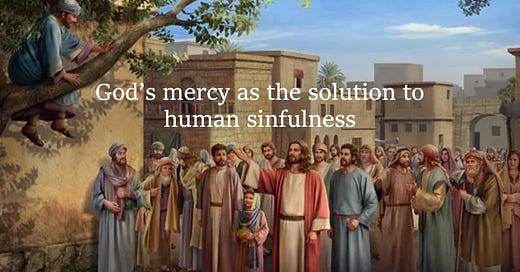God’s mercy as the solution to human sinfulness
October 10, 2023 - Tuesday, 27th Week in Ordinary Time
Psalm 130:1b-2, 3-4ab, 7-8
Psalm 130 belong to the songs of ascent (Ps 120-134) sung by the pilgrims going to Jerusalem. I once imagined that this psalm was sung by the pilgrims from Galilee while they were passing through Jericho. Considered to be the oldest continuously inhabited city in the world, Jericho is also the lowest city on our planet 258 m below sea level located near the Dead Sea associated with the sins of Sodom and Gomorrah.
The psalmist cries to the Lord “out of the depths” of a crisis that threatens to destroy his life. The Gospels tell us that while Jesus was passing through Jericho, one or two blind men called out to him from the depths of their darkness asking to see: “Lord, have mercy on us, Son of David!” (See Matt 20:29-34; Mark 10:46-52; Luke 18:35-43). The psalmist links his profound life crisis with sin. Again, the Gospel of Luke preserves for us a story of a rich tax collector from Jericho visited by Jesus and brought to repentance (see Luke 19:1-10).
The psalmist asks a rhetorical question: “If you, O LORD, mark iniquities, LORD, who will survive?” (Ps 130:3). Other translations render the main verb of this question as “watch for” or “keep track of”. So, if the Lord would watch for our wrongs or keep track of our inquiries we would be finished. The Bible makes it clear that nobody is without sin. Ten righteous people could not be found in Sodom and Gomorrah and one righteous could not be found in Jerusalem during the time of Jeremiah to save those cities. Upon seeing the Lord, Isaiah cried that he was doomed considering himself sinful and living amid sinful people (see Is 6:5). According to Psalm 14, the Lord cannot find even one person that does good (see Ps 14:2-3) and Saint Paul declares that we have all sinned and fall short of God’s glory (see Rom 3:23).
But then, the psalmist makes a remarkable statement: “But with you is forgiveness, that you may be revered” (Ps 130:4). Not punishment but God’s mercy causes us to hold God in awe and reverence. This theological notion is at the heart of the message of the Gospel captured by Saint Paul in one sentence: “Yes, all have sinned; all fall short of God’s glorious ideal; yet now God declares us “not guilty” of offending him if we trust in Jesus Christ, who in his kindness freely takes away our sins” (Rom 3:23-24, Living Bible).
The psalmist ends his poem with a message of hope: the Lord “will redeem Israel from all their iniquities” (Ps 130:8). Yet, the Lord did something greater, he redeemed the whole world from their sins. Jesus Christ “is the propitiation for our sins, and not for ours only but also for the sins of the whole world” (1 John 2:2). Nearly two thousand years later, as human sinfulness was about to engulf the whole world in a madness of the Second World War, Jesus spoke to a Polish nun, St. Faustina saying: “My mercy is greater than your sins and those of the entire world. Who can measure the extent of my goodness?” (Diary, 1485).
Psalm 130 is a psalm of hope. The psalmist waits for the Lord’s grace of redemption that alone can transform us from sinners into saints, from the doers of unrighteousness to the doers of justice, from being engulfed by the chaos of sin to being enveloped by the power of grace. Let us patiently wait with the psalmist for this transformation in our lives and the lives of the people around us.




